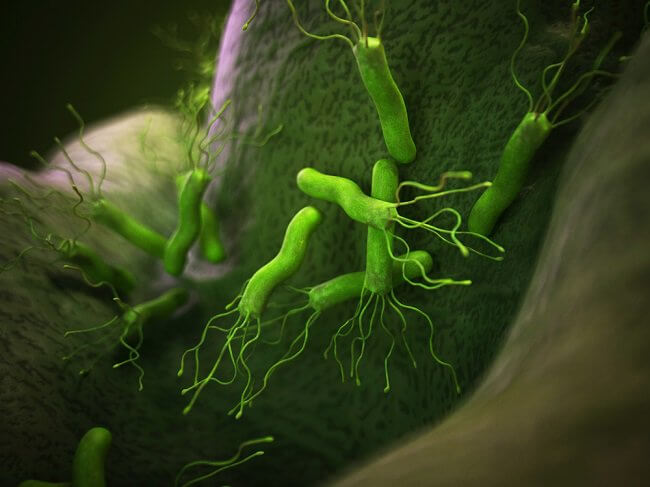H. pylori is a bacterium that has adapted to the acidic environment of the stomach and is often found in about 50% of the world’s population. Most infections are asymptomatic, but can also be manifested in varying degrees of dyspepsia, pain, or discomfort in the upper abdominal cavity.
Helicobacter pylori can cause various diseases of the digestive system such as:
- gastritis ,
- peptic worth and
- rarely cancer or gastric lymphoma
H. pylori infects the mucous membrane of the stomach or duodenum (the initial part of the small intestine), which can be damaged directly or indirectly by the activation of the immune system, which leads to the release of various enzymes and substances toxic to the mucosa. Such damaged mucous membranes are also more sensitive to the effects of digestive juices such as gastric acid, which can lead to further damage.
Helicobacter pylori – symptoms
Most infected people have no symptoms, but if the infection leads to peptic ulcer or gastric cancer, the most common symptoms are:
- pain or discomfort most commonly in the upper abdomen,
- flatulence ,
- feeling full in the stomach after a small meal,
- decreased appetite,
- nausea or vomiting,
- a dark chair
- bleeding can lead to anemia and increased fatigue.


Diagnosis of Helicobacter pylori – tests
Diagnostic tests are performed in the treatment of gastritis and peptic dysfunction; asymptomatic people are generally not performed except for people with a family history of gastric cancer and people from China, Korea, Japan or Central America who have a higher incidence of gastric cancer.
Non-invasive tests
- H. pylori antibody determination from the blood – sensitivity and specificity of the test is greater than 85%, but the antibody level shows a significant decrease only 6 months to one year after successful therapy, and antibodies can be proven after 3 years so that the test does not used to evaluate the success of therapy.
- Urea Exhalation Test – A patient is given a urea which, unlike the otherwise present C12 carbon, contains C13 or C14. When a patient enters this urea into the stomach where H. pylori is located, it breaks it down into ammonia and carbon dioxide containing C13 or C14 and can be detected in exhaled air. The sensitivity and specificity of the assay is greater than 90%, and the assay may be false negative after the use of antibiotics or proton pump inhibitors and may be performed 4 weeks after antibiotic use or one week after the use of proton pump inhibitors.
- Stool testing for H. pylori-related proteins (antigens) .
Invasive tests
- Gastrointestinal mucosal biopsy – a bacterium can be proven by a rapid urease test (RUT), which is based on the fact that bacterial urease will change the color of the special medium if present in the tissue. If this test is negative and there is a strong clinical suspicion of infection, histological staining can be performed and the bacterium visualized.
Complications associated with Helicobacter pylori infection
- Peptic acid (“ulcer”, ulcer) – the naked part of the mucous membrane of the digestive tract, especially in the stomach and the beginning of the duodenum. Symptoms are usually burning pain that stops after eating. It is treated by reducing acid secretion, eradication of H. pylori and avoiding anti-inflammatory drugs.
- Gastritis – inflammation of the gastric mucosa. Many cases are asymptomatic, but dyspepsia and bleeding can occur. It is treated causally, most often by treating H. pylori infection.
- Gastric cancer – Many factors affect the incidence of gastric cancer, and H. pylori plays a significant role. Symptoms include early satiety, obstruction and bleeding. It is treated mainly surgically.

Helicobacter pylori – treatment
Helicobacter pylori should be eradicated (destroyed) in patients with complications (gastritis, dysfunction, cancer, lymphoma).
The treatment of asymptomatic infections is controversial . Some countries’ guidelines recommend treating an infection in patients who require long-term anti-inflammatory drug therapy such as ibuprofen, since medicines in this group cause gastric mucosal damage.

The infection is treated with a combination of antibiotics and proton pump inhibitors.
Proton pump inhibitors reduce gastric acid secretion, suppressing bacteria and increasing antibiotic effectiveness. The most commonly recommended triple therapy is omeprazole / lansoprazole + clarithromycin + metronidazole / amoxicillin for 14 days.
Testing is then repeated to determine if the pathogen has been eradicated (usually) by testing the stool or urea with an exhalation test.
Up to 20% of patients will not be cured after the first treatment, so the procedure is repeated with one antibiotic changed for another 14 days. If eradication does not occur afterwards, some experts recommend gastroscopy and biopsy tissue sampling to determine the bacterial susceptibility to antibiotics (antibiogram).






